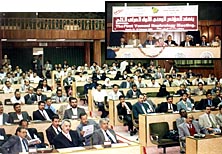
Kidney Conference in Yemen Concludes 75% OF THE 6600 CASES OF KIDNEY PROBLEMS IN YEMEN ARE PREVENTABLE! [Archives:1999/08/Health]
February 22 1999

Dr. Abdulla Al-Khadir, Director of the Department of Post Graduate and Academic Affairs, and Director of the Department of Nephrology at Riyadh Armed Forces Hospital.
” Yemen should really pay more attention to preventing diseases, rather than curing them. There are many diseases, such as malaria, bilharzia and gastric problems, which are a definite causes of kidney diseases. All of these diseases I have mentioned are preventable, and can be easily eradicated. If these diseases are eradicated in Yemen, I am pretty sure that incidents of kidney diseases will drop by 75 %.” Dr. Khadir said.
In the Middle East kidney diseases occur in the 30-40 age group. These are the productive people, with young families depending on them, so kidney diseases have social and economical implications, and this is another reason for the need to pay more attention to this disease.
” The number of kidney patients in Yemen is on the increase, every year it is estimated at 350 patient per million per year, and the only way out of this is transplantation. In order to do that we must help the National Kidney Foundation (NKF), and extend all the support needed from the government, the public, the media, and businessmen.” he added.
Prof. Claudio Ponticelli, of Maggiore Di Milano Hospital presented a paper on the problem of lupus nephritis, a sever renal disease that mainly affects women of child-bearing age. He feels that the conference was very fruitful, because many of the most important topics in clinical Nephrology were covered. “I would like to point out the importance of early and appropriate antibacterial treatment in order to prevent some glomerular diseases which have almost disappeared in Western Europe, while they are still frequent in Yemen. I believe the Yemen Health Authority should make every effort for organizing an effective cadaver transplant program, and involve the mass media in a well designed educational program, to educate the general public,” Dr. Ponticelli advised.

“The budget allocated for health is unspeakably low, $1.4 million per year less than $3 per person/per year. And I still feel that, we can prevent about 70%-75% of kidney diseases, if we spend our funds in proper ways, mainly on prevention measures rather than treatment, and this can save us a lot of money.”

“For a kidney patient, most nephrologists agree that the ideal treatment is transplantation, and not dialysis. Costwise, it is less expensive.” said Dr. Faisal.
“The most difficult part of transplantation is finding a donor. We do have thousands of cadavers every year, and if the family of a dead person agrees to donate some of his organs, we will have no shortage at all. And as far as religion is concerned, it is permitted,” he added. Dr. Shaheen final words to Yemeni doctors were to search for financial support from the sources available within the country.
Dr. Abo-Bakir Al-Qerbi, Prof. at the Faculty of Medicine Sanaa University, explained that the objectives of this conference were to give Yemeni scientists a chance to present their research papers, to prove that we actually can undertake research activities in Yemen, as well as to learn from the large number of visiting experts, and last but not least, to highlight the various issues regarding the renal diseases in Yemen.
” One of the facts that emerged in this conference is that there are differences in the causes of such diseases, between Sanaa and Aden, and this could be because of the environment, drinking water or infectious diseases they contract, or it could by because of the dietary habits. This fact will help us to look more closely into the details of the causes of chronic renal failure diseases in Yemen,” he added .
He also explained that the Doctors Syndicate has not been active for the last 6 years, and is not playing its role in pushing forward major medical problems the country is facing. “We hope a new leadership will be elected in order to make the medical association more co-operative with the ministry of health, and allow it to be more involved in promoting medical professionals.”
By: Hatem Bamehriz
and Basam Al-Saqqaf,
Yemen Times
——
[archive-e:08-v:1999-y:1999-d:1999-02-22-p:./1999/iss08/health.htm]


